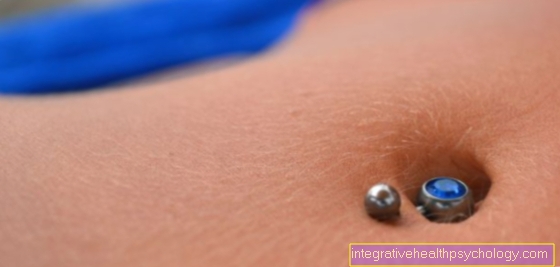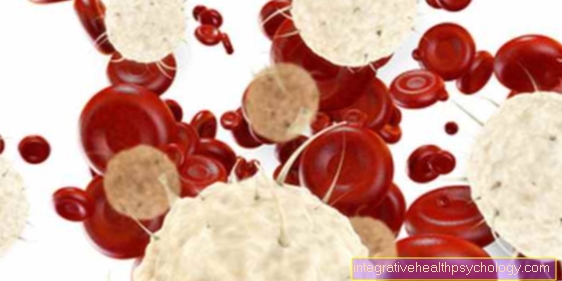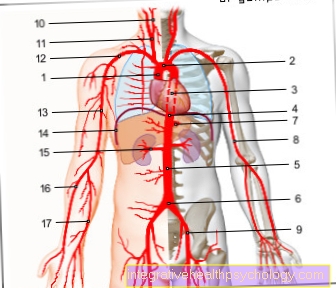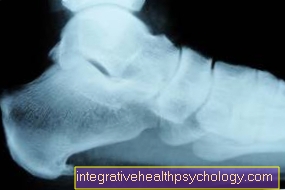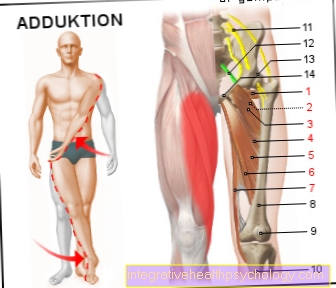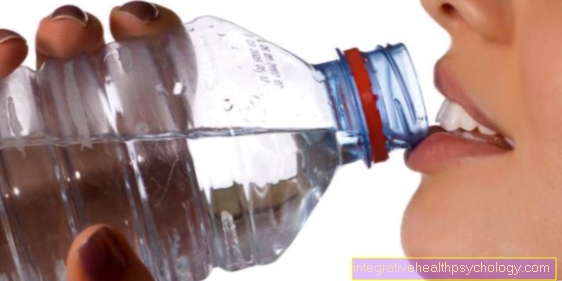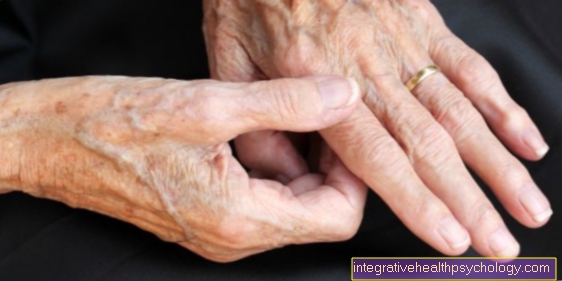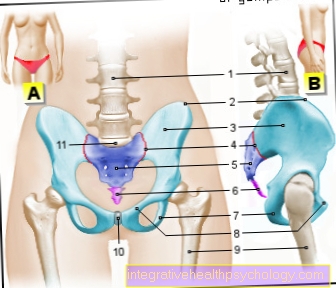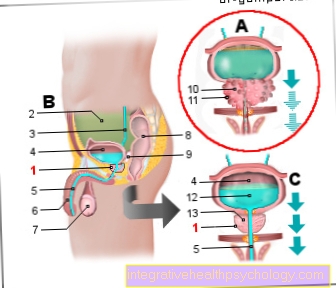Anal eczema
introduction
Anal eczema is an inflammation of the skin on the anus, doctors speak of dermatitis of the anoderm (inflammation of the anus). Anal eczema is relatively common. Affected patients should therefore not be ashamed to consult a doctor to treat the symptoms.
In most cases, anal eczema is a consequence of various other diseases and can be acute (sudden) or chronic (protracted).

Classification of anal eczema
Anal eczema can be classified according to various criteria.
According to the time course, it is divided into an acute, subacute (relatively suddenly) or chronic anal eczema.
A classification according to the causes is also possible and useful. There are irritative-toxic, atopic (atopy denotes the tendency to hypersensitivity reactions) and contact allergic anal eczema. Several causes usually play a role in chronic anal eczema.
Symptoms of anal eczema
The main symptom of anal eczema is also the worst for the patient: very severe itching, which doctors consider Pruritus ani, or itching of the anus.
The skin on the anus is reddened, depending on the cause of the anal eczema, reddening with a sharp or fuzzy border occurs.
Another symptom is oozing of the anus, which softens the skin. The softening can lead to whitish discoloration in the area of the anal eczema.
In chronic anal eczema, erosions and tears of the skin, so-called rhagades, are also common.
Blood on the anus in anal eczema
The most common bleeding of the intestine and anal area is caused by hemorrhoids, tears in the mucous membrane of the anus, inflammation of the rectum or colon cancer.
Blood in the anus does not always have to be caused by a malignant disease. Anal eczema can also lead to blood in the anus, which can tear the inflamed skin and cause bleeding. The blood can also be deposited in the stool. If the bleeding was caused by anal eczema, the bleeding should go away with therapy.
Diagnosis
To diagnose anal eczema, the doctor will ask you to speak to yourself to clear the bottom and with angled Legs to lay on an examination couch. Anal eczema offers one in most cases clear picture for the examining doctor.
Having an anal eczema blurred edges speaks more for one irritative-toxic causehaving an anal eczema sharp boundary for a allergic contact eczema.
In some cases it may be necessary to have a smear to make to one Fungal disease to exclude. Maybe there is also a small one Sampling needed to get a microscopic examination of the fabric. The microscope can confirm or rule out other diseases that can look very similar to anal eczema: Anal cancer, the psoriasis (psoriasis) the anal fold and other, less common skin diseases. In many cases, hemorrhoids are one of the causes of anal eczema. If the doctor finds you have hemorrhoids, they will perform a proctological examination of the Rectum be necessary.
Causes of Anal Eczema
There are many causes of anal eczema. Affected patients often have hemorrhoids, which make anal hygiene difficult after using the toilet. Any stool remaining on the anus leads to irritation of the surrounding skin and thus causes irritative-toxic anal eczema. An additional irritation of the skin occurs from the oozing of the hemorrhoids.
In a similar way skin tags (harmless skin folds at the transition from the anal mucous membrane to "normal" skin) or anal prolapse (prolapse of the anal canal from the anus) lead to irritative-toxic anal eczema.
Other causes include inadequate or excessive anal hygiene, excessive sweating or clothing that is too tight. For example, contact allergic anal eczema occurs as a reaction to preservatives or fragrances in damp toilet paper. However, medical products such as hemorrhoid ointments or suppositories can also trigger contact-allergic anal eczema in some people.
Atopic anal eczema occurs in patients with neurodermatitis, typical of which is itching of the anus that only occurs in phases.
Other causes of anal eczema are fungal infections of the anus or chronic psoriasis, which can also manifest on the anus.
Chronic anal eczema usually has several of the causes mentioned.
Is anal eczema contagious?
It is impossible to say in general whether anal eczema is contagious. The decisive factor is the cause of the skin irritation. If the eczema is caused by skin diseases such as neurodermatitis or psoriasis, it is not contagious and therefore no special precautionary measures have to be observed. Even in the case of allergic reactions or mechanical irritation, there is no risk of infection. If it is a cancer, no infection is possible.
The situation is different with eczema, which is caused by pathogens such as bacteria, fungi or viruses. Strict hygiene with adequate disinfection of hands and contact surfaces should be observed here so as not to infect the environment.
Treatment of anal eczema
Simple methods that can be used without a doctor's visit can easily be done at home. It is advisable to clean the anal area with lukewarm water after using the toilet and carefully pat dry. Remnants of stool are removed and the skin on the anus is prevented from softening.
Patients with anal eczema should avoid using moist toilet paper, as it can irritate the skin in the anal area. It is also important not to use any special washing lotions or grease wipes for the anal area. These contain fragrances and preservatives that are harmful to the sensitive skin of the anus.
If these simple methods do not improve the anal eczema, a doctor should be consulted to begin drug treatment.
Further treatment for anal eczema
In addition to good anal hygiene, as described above, warm hip baths with oak bark or other tannins help to alleviate the symptoms of anal eczema.
The treatment is supported by a sufficient amount of water and a healthy diet with a lot of fiber, since a soft stool does not irritate the anal eczema additionally. Avoiding hot spices also helps to protect the inflammatory skin around the anus.
In addition to this self-treatment, anal eczema should be treated by a doctor.
How to get rid of the itchiness
Treating anal eczema also relieves itching. If the anal eczema is due to an allergic cause, taking antihistamines can help against the itching.
Otherwise, you should wait until the therapy of good anal hygiene, hip baths and ointments works.
Therapy of anal eczema with medication
In addition to good anal hygiene and disinfecting hip baths, drug therapy with ointments, which a doctor can prescribe, is also suitable for treating anal eczema. The treatment of anal eczema can be carried out by a family doctor, a proctologist, a gastroenterologist, a general internist or a dermatologist (dermatologist).
In the short term, it is advisable to use a cortisone ointment, which is replaced after a while by a soft zinc paste. Cortisone counteracts an excessive reaction of the immune system and thus curbs inflammation. The zinc paste has an anti-inflammatory and drying effect, so the inflammation is treated and a renewed softening of the skin is prevented.
If the anal eczema is colonized with bacteria, disinfecting ointments or ointments with antibiotics are used.
In the case of severe pain, an analgesic ointment that contains local anesthetics and numbs the skin in the anal area can be prescribed. However, this type of ointment should not be used for anal eczema that has an allergic cause.
If hemorrhoids are the reason for anal eczema, they must be treated, since a therapeutic success with ointments is then hardly or not at all to be expected.
Creams and ointments
If you suffer from anal eczema, various ointments and creams can help. If it is only mechanically irritated, dry skin, nourishing, moisturizing creams can provide relief and alleviate the symptoms. Here you can get good advice, for example in the pharmacy.
If the eczema is a manifestation of a skin disease such as neurodermatitis or psoriasis, creams with medicinal ingredients may be necessary. This should be prescribed by the dermatologist and used strictly according to his instructions.
If it is an infection with bacterial pathogens, ointments that contain an antibiotic may be necessary, which are then applied locally to the eczema. In the case of a fungal infection, there are also antifungal ointments that can work directly against the fungi.
When do you need cortisone?
With some anal eczema, the use of cortisone may be necessary. This can be done locally with an ointment or systemically with tablets. It is not possible to say in general when cortisone is necessary; what is important here is the cause and severity of the eczema. For example, with psoriasis or neurodermatitis, a cortisone ointment works well against the inflammation and can lead to rapid healing. Only the attending physician can judge whether a cortisone treatment is necessary. Under no circumstances should therapy be started on one's own, as the cortisone could worsen the disease!
Zinc ointment
Many patients who suffer from eczema like to use the over-the-counter zinc ointment. The ointment supplies the skin with moisture and has an anti-inflammatory and disinfectant effect. So it can have a soothing effect on the symptoms, especially in the case of slight inflammation, and bring about faster healing. It is important that zinc ointments are only applied to the skin, so as soon as it is torn, the use of zinc ointments should be avoided. If in doubt, seek advice from a doctor or pharmacist.
Homeopathy for anal eczema
Homeopaths recommend taking Kalium sulfuricum or Thuja occidentalis for anal eczema.


